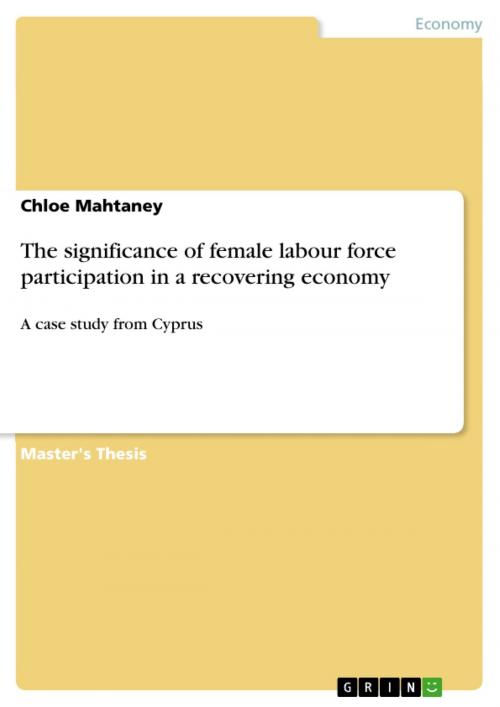The significance of female labour force participation in a recovering economy
A case study from Cyprus
Business & Finance, Management & Leadership, Management| Author: | Chloe Mahtaney | ISBN: | 9783668209718 |
| Publisher: | GRIN Verlag | Publication: | May 4, 2016 |
| Imprint: | GRIN Verlag | Language: | English |
| Author: | Chloe Mahtaney |
| ISBN: | 9783668209718 |
| Publisher: | GRIN Verlag |
| Publication: | May 4, 2016 |
| Imprint: | GRIN Verlag |
| Language: | English |
Master's Thesis from the year 2015 in the subject Business economics - Business Management, Corporate Governance, grade: Distinction, South Bank University London (London South Bank University School of Business), course: MBA, language: English, abstract: This dissertation considers that increasing Female Labour Force Participation (FLFP) can highly contribute during the recovery process of an economy in crisis and how the Cyprus job market has changed from pre to post crisis resulting in a high demand for jobs today. High demand for jobs means that employers have a surplus of potential candidates to select from and therefore it can be assumed that they will be inclined to selecting candidates that can work under the terms of the employer. In most cases, the demographic that is most likely be able to live up to those terms are the men in the Cyprus labour force. While beneficial in the short-run in respect of keeping HR budgets low, the dissertation questions how this may impact companies in the long-run in terms of job satisfaction and performance. Assessment of the level of Work Life Balance (WLB) offered by corporate organisations is determined through primary and secondary forms of research and investigates whether or not it correlates to the lack of female decision-makers and the Gender Pay Gap in Cyprus. It identifies that the gender discrimination in the workplace in Cyprus does very much still exist namely due to traditionalist corporate cultures that are still in place as well as examining limitations imposed on women in terms of achieving senior roles in the workplace. The rationale for primarily determining the current existence of these problems is to bring another assumed problem to the table of which that is the lack of flexible work options that Cyprus has on offer and in turn how opening the doors to more FLFP can benefit the private sector's performance in the market and in turn vastly contribute in terms of profitability to a recovering economy.
Master's Thesis from the year 2015 in the subject Business economics - Business Management, Corporate Governance, grade: Distinction, South Bank University London (London South Bank University School of Business), course: MBA, language: English, abstract: This dissertation considers that increasing Female Labour Force Participation (FLFP) can highly contribute during the recovery process of an economy in crisis and how the Cyprus job market has changed from pre to post crisis resulting in a high demand for jobs today. High demand for jobs means that employers have a surplus of potential candidates to select from and therefore it can be assumed that they will be inclined to selecting candidates that can work under the terms of the employer. In most cases, the demographic that is most likely be able to live up to those terms are the men in the Cyprus labour force. While beneficial in the short-run in respect of keeping HR budgets low, the dissertation questions how this may impact companies in the long-run in terms of job satisfaction and performance. Assessment of the level of Work Life Balance (WLB) offered by corporate organisations is determined through primary and secondary forms of research and investigates whether or not it correlates to the lack of female decision-makers and the Gender Pay Gap in Cyprus. It identifies that the gender discrimination in the workplace in Cyprus does very much still exist namely due to traditionalist corporate cultures that are still in place as well as examining limitations imposed on women in terms of achieving senior roles in the workplace. The rationale for primarily determining the current existence of these problems is to bring another assumed problem to the table of which that is the lack of flexible work options that Cyprus has on offer and in turn how opening the doors to more FLFP can benefit the private sector's performance in the market and in turn vastly contribute in terms of profitability to a recovering economy.















